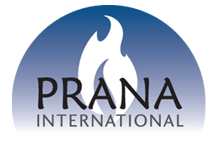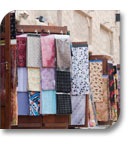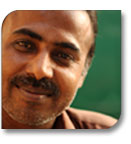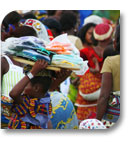|
 |
Lalita has an existing garment business based out of her home and wishes to increase her volume. Uma intends to sell hair clips, combs, talcum powder etc. Soumita is setting up a business selling cosmetics door to door. Krishna plans on setting up a small store selling garments. Lalita has taken a loan of $250, Soumita, Uma and Krishna have each borrowed $125. The repayment plan is for a year, although all three are confident of repaying within a shorter time frame.
Tapati, Dolly, Asha and Rekha have all taken loans. Tapati like Uma plans to sell combs, clips, nail polish, talcum powder etc. She is interested in starting small with a $100 loan. Dolly and Asha are both planning on selling womens wear and have borrowed $250 and $150 respectively. Rekha has borrowed $125 to help grow her family business selling home cooked food.
Kalpana sells saris, blouses, petticoats, and dresses door to door and has taken a loan of $250. Sanju is interested in selling snack foods and has borrowed $25 to get started. Chanda Devi has been selling fresh fruits and vegetables and would like to sell in larger volumes. She has been lent $250. Tulsi is an enterprising lady in her seventies who has been selling seasonal products catering to the different religious festivals as well as apparel and undergarments for men and women. She has borrowed $250 to grow her business.
Other individuals waiting to avail of loans are Sita, Dolly and Sanju who would like to start a garment business as a joint venture and would like to begin with a loan of $125. Jyoti, Moni, Vikas and Ravi are a group of young people who are enthusiastic to begin a garment business.
Shobha has a vegetable business but is unable to increase her volume due to lack of funds. A loan would help her purchase larger volumes and earn more. Her requirement is $125 and her target repayment is six months
|
|

 Kolkata, India Kolkata, India
Nestled on the banks of the River Ganga (Ganges) sits the 300 year old city of Kolkata formerly known as Calcutta. This former jewel of the British Raj used to be the first capital of India. It is now the capital of the state of West Bengal. A city and state made known by noble laureates Rabindranath Tagore (Literature), Amartya Sen (Economics), Venkat Raman (Physics) and of course Mother Theresa (Peace). With over 9 million people this metropolitan port city displays the typical contradictions of urban life. One can see the stark contrast of the beautiful architecture of the Victoria Memorial Hall and St Paul’s Cathedral with that of the one-room street dwellings of the poor and the disenfranchised. Tin roofs with holes stand out against the backdrop of glass, steel and concrete and calloused bare feet of the laborers against the shiny steel of the chauffeur driven cars of the wealthy. The divide between the rich and the poor is stark!
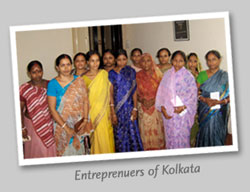 It is here that Emmanuel Ministries Calcutta (EMC) and its sister organizations have been serving the poor and the disenfranchised since the early seventies. Founded by Vijayan and Premila Pavamani who have committed their lives to serving the poor, EMC has programs serving addicts and alcoholics, pavement dwellers, sex workers and children from the slums. With program funding from international organizations such as the UN and ILO they are a solid and well established organization with a relatively flat organizational structure. They work with the disenfranchised on a daily basis which gives them a deep understanding of the needs of the affected people as well as strong relationships and trust within these communities. It is here that Emmanuel Ministries Calcutta (EMC) and its sister organizations have been serving the poor and the disenfranchised since the early seventies. Founded by Vijayan and Premila Pavamani who have committed their lives to serving the poor, EMC has programs serving addicts and alcoholics, pavement dwellers, sex workers and children from the slums. With program funding from international organizations such as the UN and ILO they are a solid and well established organization with a relatively flat organizational structure. They work with the disenfranchised on a daily basis which gives them a deep understanding of the needs of the affected people as well as strong relationships and trust within these communities.
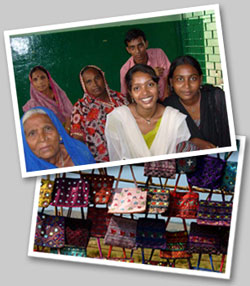 We have funded a start up microcredit program with Emmanuel Ministries. EMC is setting up lending groups in the New Market and Lokhermath areas of Kolkata. New Market is an old establishment and is a shopping hub for the city. In contrast to the high end shops, pavement dwellers eke out a living working as laborers or selling such goods as woven baskets and fresh flowers in and around the area. Lokhermath is one of the red light districts of Kolkata. EMC has been working with commercial sex workers and their children to increase literacy and reduce health issues such as AIDS and STDs. The goal is to give the women an alternate source of income so that they do not need to rely on prostitution to support themselves and their families. We have funded a start up microcredit program with Emmanuel Ministries. EMC is setting up lending groups in the New Market and Lokhermath areas of Kolkata. New Market is an old establishment and is a shopping hub for the city. In contrast to the high end shops, pavement dwellers eke out a living working as laborers or selling such goods as woven baskets and fresh flowers in and around the area. Lokhermath is one of the red light districts of Kolkata. EMC has been working with commercial sex workers and their children to increase literacy and reduce health issues such as AIDS and STDs. The goal is to give the women an alternate source of income so that they do not need to rely on prostitution to support themselves and their families.
|
